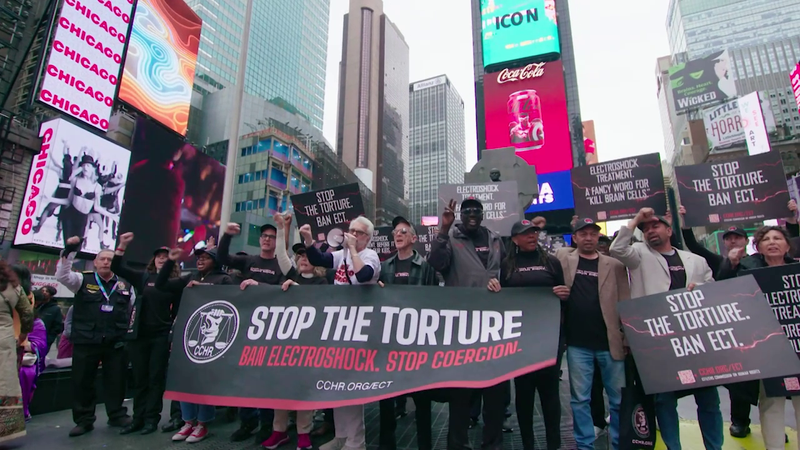Citizens Commission on Human Rights marches in protest, opens human rights exhibit, delivers open letter to American Psychiatric Association leadership demanding it adopt international human rights standards to end coercive psychiatric practices.
Citizens Commission on Human Rights (CCHR), a mental health industry watchdog, launched a series of actions to draw attention to the American Psychiatric Association’s (APA) refusal to reverse its support of forced psychiatric treatment, remaining instead at odds with international human rights standards and leaving the US lagging the global movement to restore human rights in the field of mental health. Coercive psychiatric practices include involuntary institutionalization, forced drugging, mechanical and chemical restraints, seclusion, and nonconsensual electroconvulsive therapy (ECT, or electroshock).
In a protest march organized by CCHR, demonstrators marched through Times Square to the Javits Center in New York City on May 4, site of the APA’s annual conference, drawing the attention of conference attendees with chanting and signs demanding an end to forced psychiatric treatment, a ban on ECT, and an end to the rampant psychiatric drugging of children. As a follow-on to the APA’s 2021 admission that systemic racism is ingrained in psychiatric practices, signs also demanded an end to those racist practices.

Overhead, an airplane banner called for the banning of ECT, while a Jumbotron truck driving in the area broadcast CCHR’s documentary, Therapy or Torture: The Truth About Electroshock.
CCHR also hand-delivered an open letter to the leadership of the APA, Petros Levounis, President, and Saul M. Levin, Chief Executive Officer, at their conference, calling on the organization to renounce involuntary mental health treatment. Copies of the letter were sent to the heads of the UN Office of the High Commissioner for Human Rights (OHCHR) and the U.S.-based office of the World Health Organization (WHO).
In 2023, WHO and OHCHR called for an end to all forced mental health treatment, saying coercive practices “violate the right to be protected from torture or cruel, inhumane and degrading treatment.” WHO/OHCHR also advised, “International human rights standards clarify that ECT without consent violates the right to physical and mental integrity and may constitute torture and ill-treatment,” and called for banning ECT for children. ECT passes electricity through the brain to cause convulsions, with the risk of brain damage and permanent memory loss.
The CCHR letter also referenced 2021 guidance from WHO that coercive mental health treatment should end even for those experiencing acute mental distress, pointing out that individuals in mental health crisis “are at a heightened risk of their human rights being violated, including through forced admissions and treatment….These practices have been shown to be harmful to people’s mental, emotional and physical health, sometimes leading to death.”
Among international psychiatric organizations, the World Psychiatric Association has stated its concern about “the extent to which coercive interventions violate” human rights, and the European Congress of Psychiatry has held a special session aimed at reducing the use of coercive measures. Julian Beezhold, MD, current chair of the European Psychiatric Association’s Section on Emergency Psychiatry, is also on record saying that examining how to reduce coercive practices in psychiatry is a priority for his association.
In contrast, the APA has maintained its support of the profitable practices, which have left maimed and traumatized patients in their wake.
“We demand the APA renounce coercive practices that damage and traumatize patients and, in the case of ECT, cause brain damage, memory loss and even death in the name of mental health treatment,” said Anne Goedeke, president of the CCHR National Affairs Office in Washington, DC. “Psychiatrists should not be exposing their patients to these unconscionable risks.”
Watch now: Video from CCHR’s NYC protest and exhibit:
New Yorkers were invited to tour CCHR’s “Psychiatry: An Industry of Death” exhibit, which ran through May 12 at Union Square in New York City. The free exhibit, which has toured the world, exposes some little-known history of psychiatry and how psychiatric practices have harmed patients. Facts presented in the exhibit’s panels reveal the staggering number of children prescribed psychiatric drugs, psychiatry’s sordid history of brain-damaging psychosurgery and electroshock, and the prime role of psychiatrists in instigating and perpetuating racism.
Rev. Fred Shaw, CCHR International spokesperson and founder of the CCHR Task Force Against Racism and Modern-Day Eugenics, gave the keynote address at the exhibit grand opening May 5, followed by remarks by New York human rights activists Marion “Tiny” Frampton, a former gang member in The Black Spades (TBS) and now Harlem community activist and founder of TBS New Directions; former Harlem Globetrotter, now international goodwill ambassador Bobby “Zorro” Hunter; and Maliki Stone, human rights advocate and retired detective with the New York Police Department.
